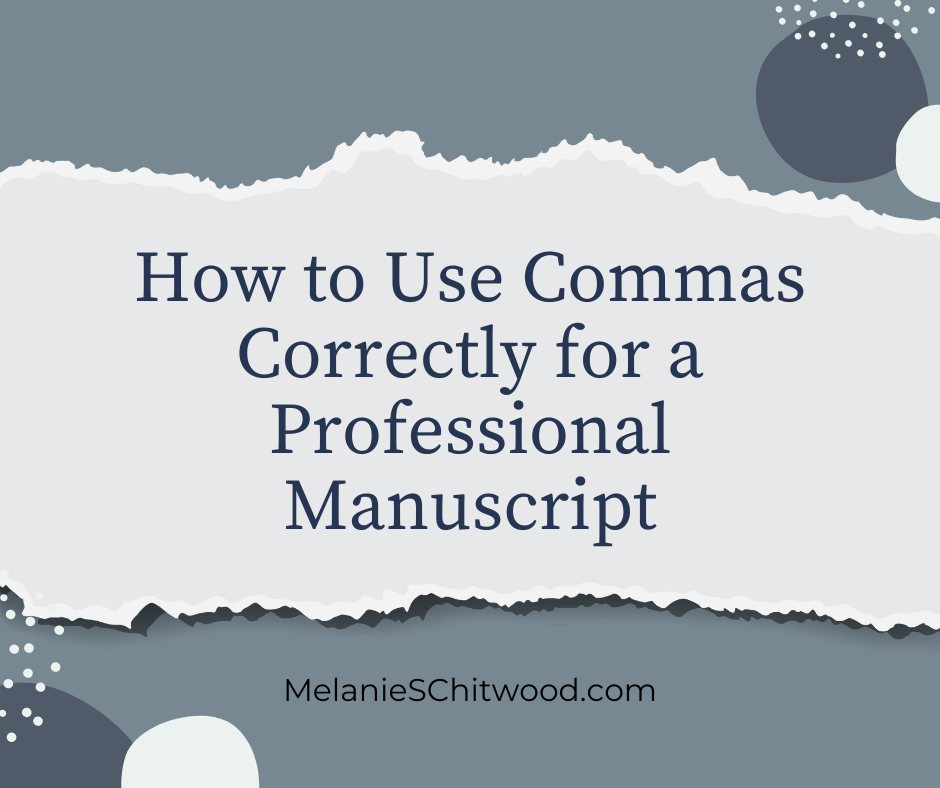Tips for Using Commas Correctly for a Professional Manuscript
I’ve been writing a series of posts about some of the common punctuation mistakes I see in manuscripts when I’m editing.
(see these previous posts on punctuation tips and eliminating unnecessary words)
Let’s get started on some tips about commas.
Introductory Prepositional Phrase
An introductory prepositional phrase is a group of words at the beginning or introduction of a sentence; that group of words includes one or more prepositions; and that group of words is not a sentence on its own.
So what’s a preposition? It’s a little word-at, in, on, of, for, to name a few-showing position, location, direction, or time. (here’s a list of prepositions)
The rule is this: Place a comma after the introductory prepositional phrase.
Some examples of introductory prepositional phrases (in italics below):
- At the end of this year, I hope to travel overseas.
- Behind our house at the end of our property, you’ll find a trail leading to the woods.
- During our two-week vacation to Florida, we went to the beach every day.
- In the end I liked the book.
Notice the comma after each –except the last example that does not include a comma. There’s always an exception to the rule! And here’s the exception: an introductory prepositional phrase that is short-5 words or less- does not need a comma.
Correct Example:
- Before the movie let’s get drinks and popcorn.
Note that no comma is needed after the short introductory phrase of Before the movie.
Please note: Many editing programs will tell you this is not correct and that you do need a comma after even a short introductory prepositional phrase. I usually ignore the correction. However, you can also go ahead and use the comma as suggested. (How’s that for being clear as mud!)
For example, this sentence could also be correct:
- Before the movie, let’s get drinks and popcorn.

Introductory Word
Follow an introductory word or words with a comma. Note these words show some kind of transition from one idea to the next.
Some examples of introductory words:
- Suddenly, the sky exploded with lightning.
- However, this is not what I think.
- Instead, let’s go out to dinner tomorrow night.
- As a matter of fact, you are right.
- In other words, I’d prefer that we not meet today if you think you’re going to be late.
Click here for a list of introductory words requiring a comma.
If you have other punctuation questions, let me know! I’d love to answer them.
Thanks for being here!
Melanie
P. S. To find out more about my writing coaching and editing services, check out my website. I’d love to have a 15-minute free consultation call about your writing project.
P. S. P. S. Don’t miss out on this:
My ministry friends Amy Carroll and Lynn Cowell have a released a fabulous new Bible study: Esther: Seeing Our Invisible God in an Uncertain World
What do you do when God seems to have vanished? When you have a decision to make? When your stability is shaken? When your sure-fire plan fails? When everything is spinning out of control? Esther is the perfect partner for seeing our invisible God in uncertainty. Though she lived centuries ago, Esther speaks to us when we run into limited control and resources.






Thank you for this post! Before I read it, I did not understand the proper use of commas.:)
Thank you, Sandy. So glad it helped!
Melanie